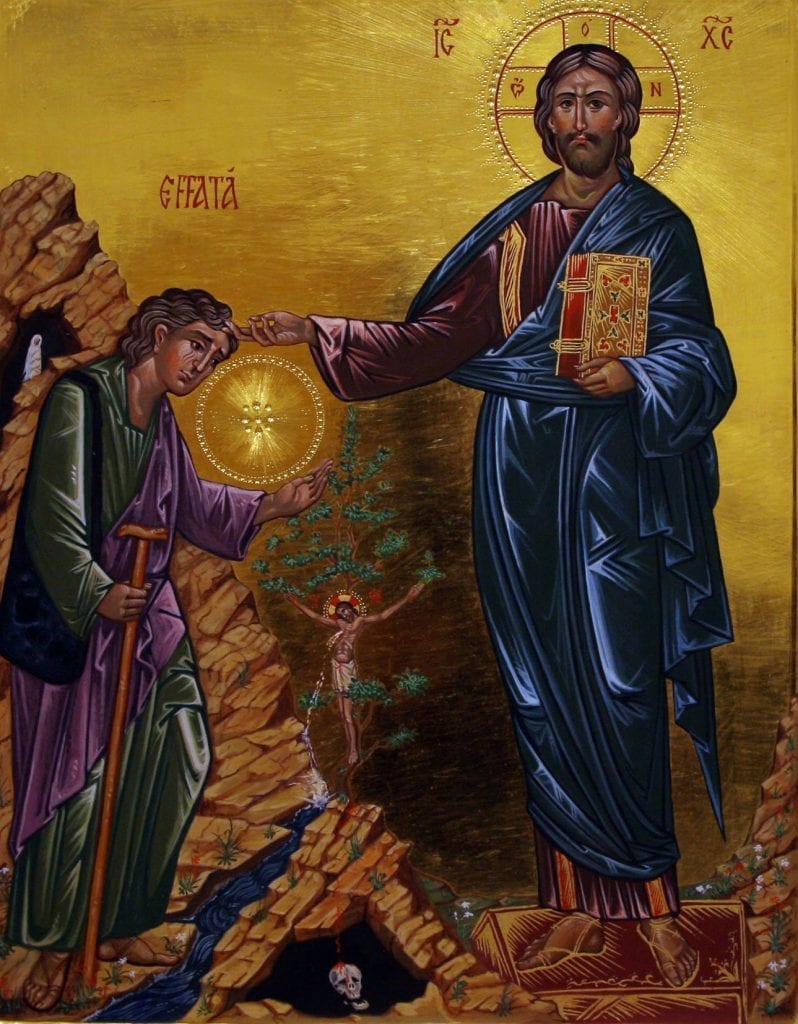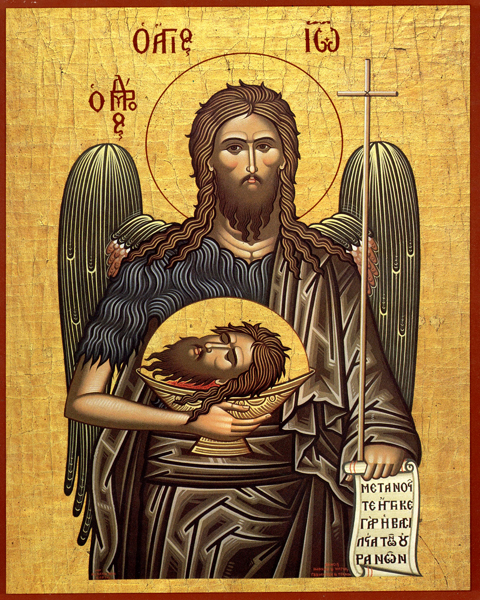HOMILY: Becoming Truth – October 20th, 2019.
Readings: Matthew 9:1-9
I would like to begin with the story of Sergios and Bakkhos, two martyrs of the Church whom we remember today.
The Holy Martyrs Sergios and Bakkhos were appointed to high positions in the army by the emperor Maximian (who ruled from the years 284-305), who did not know that they were Christians. Malevolent persons denounced them both to Maximian, that his two military-commanders did not honour the pagan gods, and this was considered a crime against the state.
The emperor, wanting to convince himself of the veracity of the denunciation, ordered Sergios and Bakkhos to offer sacrifice to the idols, but they answered, that they honored but the One God and Him only did they worship.
Maximian commanded that the martyrs be stripped of the insignia of military rank, and then having dressed them in feminine clothing to lead them through the city with an iron chain on the neck, for the mockery by the people. Then he again summoned Sergios and Bakkhos to him and in a friendly approach advised them not to be swayed by Christian fables and instead return to the Roman gods. But the saints remained steadfast. Then the emperor commanded that they be dispatched to the governor of the eastern part of Syria, Antiochus, a fierce hater of Christians. Antiochus had received his position with the help of Sergios and Bakkhos. “My fathers and benefactors! – he addressed the saints, – have pity not only upon yourself, but also on me: I do not want to condemn you to martyrdom”. The holy martyrs replied, that for them life – is Christ, and death for Him – its acquisition. In a rage Antiochus ordered Bakkhos to be mercilessly beaten, and the holy martyr expired to the Lord. They put iron shoes on Sergios feet inset with nails and sent him off to another city, where he was beheaded with the sword. All this transpired in the year 300 A.D.
So, why do we remember such as these in the life of the Church?
We are the Church of remembering. We remember those who have gone before us, for they point us towards Christ; they show us what it means to be our faith; they show us how we should respond to the world around us. We remember those who walk beside us. We remember what lies ahead of us as we walk together in Christ towards the eschaton. The Church takes great care to maintain the hagiography of our saints, the stories of those who have passed into memory, for they represent the living witness of our faith. They represent the very essence in both word and in deed in what it means to be Christian. They have gone before us, but they march ever ahead of us, for they have paved the road we now walk on. It is yet another paradox of the Christian faith, like the first shall be last and the last shall be first, when I am weak, I am strong; or the meek shall inherit the earth. Those who have come before us, walk ahead of us, living icons of Christ, lamps unto our feet.
So what is the lesson we can learn from the story of Sergios and Bakkhos, those knights and martyrs of the Orthodox faith? Always speak truth to power. We must not be like the world who seeks to change the very definitions of truth within the world around us. Who changes truth simply to be acceptable to others. We must not be like the world who seeks to confuse and disorient, shifting like sand so no foundation can be laid for one to stand on, till one is left standing like Pilate before Christ and muttering those words of searching: what is truth? We know what truth is. Truth is a person, and that person is Jesus Christ. Truth is found in the Church, for the Church is the Body of Christ, who IS Truth. The Church is the pillar and foundation of truth (1 Tim 3:15), which was established upon the apostles and prophets as her foundation (Eph 2:20). We must never be afraid to speak Christ into the world, into the face of opposition, nor persecution. We must always stand to speak Truth in the face of lies, Truth against heresies, or Truth to those in power. Truth is the last great rebellion in a world imbued with falsity and fantasy. The world may threaten our lives, but we have life eternal. The world may take away our wealth, but it was never ours to begin with, and we have even greater treasures in the kingdom of God. The world might not kill us, but it will wound us. We will be wounded time and time again in both heart, mind, soul, and God forbid in body.
Lucky for us Christ is the Great Physician. The Church, as the body of Christ, who is the great physician, is the great hospital for our very souls. To the world we may seem like an asylum of sorts, and some very well may treat us as such. Remember the words of Saint Anthony the Great when he said “A time is coming when men will go mad, and when they see someone who is not mad, they will attack him, saying, “You are mad; you are not like us.” One could reasonably say such a time is upon us. Yet, also remember the words of scripture that tells us that truth, Christ, and the message of the Cross seems like insanity to the world, but to those of us who are being saved, it is the power of God. To those of us who are being saved, it is the word of life. To those of use who are being saved, no other word matters.
Can we expect a blind man to know the sky is blue? Can we expect the deaf man to hear the words of truth? Can we expect one dying of cancer to know that he is dying, or what it is that afflicts him, unless a doctor tells him? We must be the truth to those who need it, in our words and in our lives. We become truth and take Christ into the world. We reveal their illness, talk about their wounds, and reveal the scars of our own wounds to give them hope. We seek out those in need of healing, and bring them to the great physician to be healed. The Church is the great hospital for our souls, and all are bidden. Yet, not all may come. Some cannot come on their own. Some may need the helping hands of another.
In our Gospel reading today we heard the tale of Jesus healing the paralytic. As soon as he had left his boat, and arrived into his own town, two men carried a parlyzed man to him, lying on a mat. This was a man that depended on others to be brought before Christ. When Christ set his eyes upon them, he saw not the faith of the paralyzed man, but the faith of those who brought him. It was by their faith that Jesus Christ healed the paralytic. And so he arose, healed of his infirmities of both body and soul, and carried himself back to his home.
The Church is our home. We who have been healed are the two men carrying the paralytic. Some of us, at one time, used to be the paralytic. Maybe some of us still are. Yet, we should be carrying others back to the Church in the fullness of our own faith, so that the other may be healed; that the other may find their own faith, and walk home to the Church on their own. One day, they too shall carry another back to the great Physician, for the healing of soul and body. For we are the Church, and we stand together. We are one body, brought together in one cup, one loaf, and one and the same belief and teaching. We fall alone.
Christ tells us that where two or three are gathered together in my name, I am with them. Sergios and Bakkhos stood together against the world, and Christ was with them both. Those two men stood with the paralytic, for the paralytic, and Christ was with them also. May we stand with one another always, to face the world in all that it shall bring. So, may we now stand together in one faith and one accord, for Christ is in our midst; he is and ever shall be.
Amen



